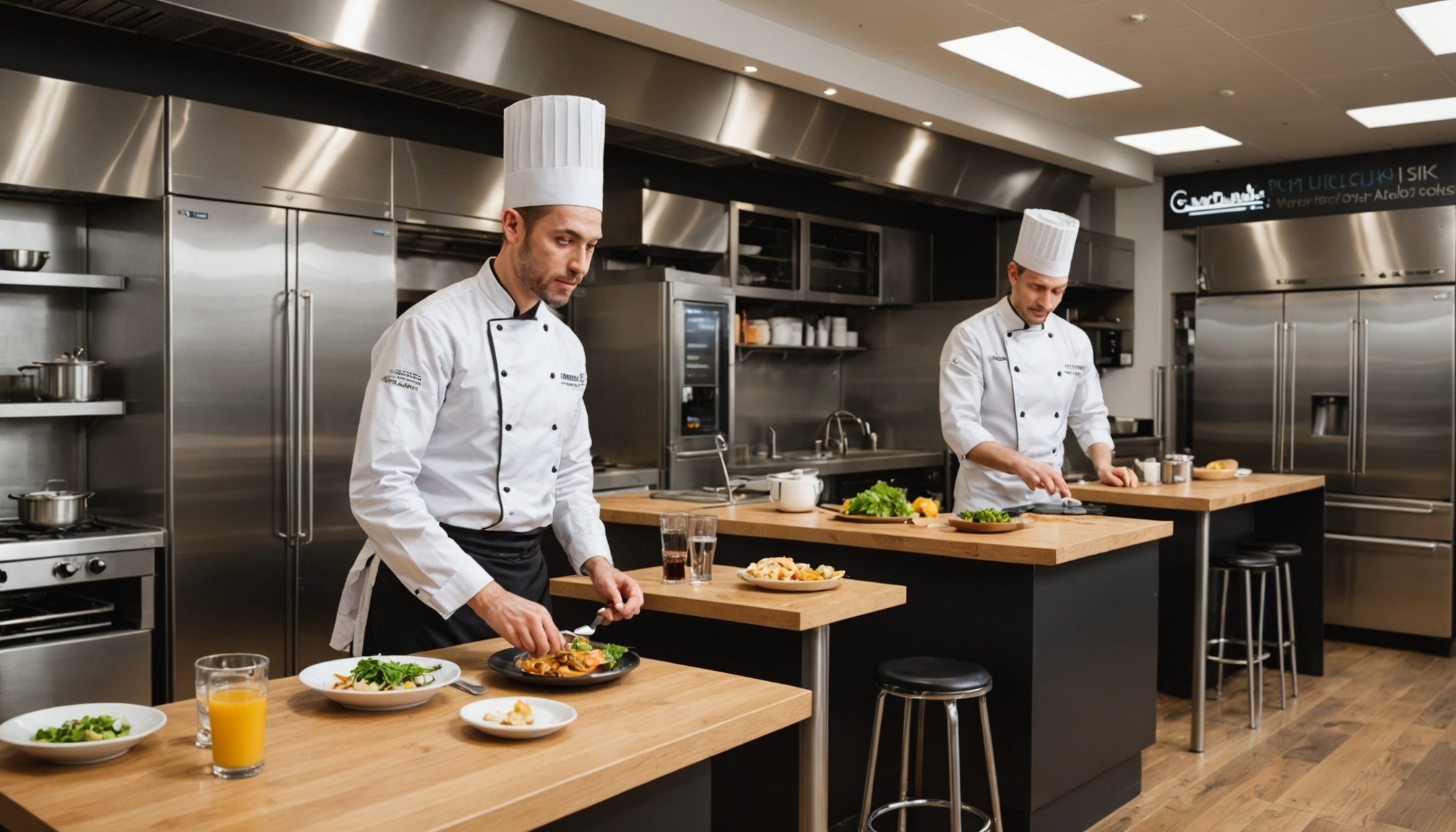Breakthrough kitchen technologies leading change in UK restaurants
Innovative kitchen technologies are transforming how UK restaurants operate, enhancing efficiency and elevating dining experiences. At the forefront are smart kitchen solutions like automated cooking systems and connected appliances that streamline food preparation and reduce human error. For example, intelligent ovens adjust cooking times based on dish requirements, allowing chefs to focus on creativity rather than routine checks.
Several UK restaurant trends reveal a growing appetite for technology integration. High-profile establishments in London and Manchester have adopted robotics to handle repetitive tasks, significantly speeding up service during peak hours. These pioneers demonstrate how automation complements culinary skills instead of replacing them.
This might interest you : What Are the Emerging Trends in the UK’s Restaurant Scene?
The UK market for kitchen innovation is expanding rapidly, fueled by demand for sustainability and precision. Chefs and restaurateurs increasingly seek solutions that minimize waste and energy consumption while maintaining food quality. This shift signals a new era where technology is pivotal to operational success and customer satisfaction in the competitive hospitality landscape.
Automation and robotics transforming food preparation and service
Kitchen automation and food robotics are revolutionizing the way UK restaurants operate. From robotic arms that precisely toss salads to smart fryers that monitor cooking times, these innovations streamline workflows and cut down on human error. By integrating labour-saving tech, restaurants save valuable staff hours, allowing employees to focus on customer experience rather than repetitive tasks.
This might interest you : What are the latest cocktail innovations in UK kitchen bars?
The impact on operational efficiency is significant. Automated cooking stations enhance consistency, ensuring dishes maintain the same quality every time. For UK restaurant automation, this means faster service and reduced wait times, both crucial for customer satisfaction.
Several UK eateries have embraced these technologies. For example, some use robotic arms for pizza assembly, dramatically speeding up preparation while maintaining hygiene standards. Others employ smart fryers that adjust temperatures automatically, reducing food wastage and improving safety.
Investing in kitchen automation and food robotics not only cuts labour costs but also boosts productivity. These labour-saving tech solutions provide a strong competitive edge for restaurants navigating today’s demanding hospitality environment.
Artificial intelligence and data-driven kitchen management
Artificial intelligence (AI kitchen technology) is transforming restaurant operations by enabling data-driven decisions that enhance efficiency and reduce waste. By integrating data analytics in restaurants, operators can optimise the entire workflow with precision.
One popular application is predictive ordering. AI algorithms analyze historical sales and external factors (such as weather or local events) to forecast demand, ensuring the right stock levels without over-ordering. This cuts food waste and inventory costs.
Smart inventory systems track ingredient usage in real-time, alerting staff before items run low. Combined with dynamic scheduling powered by AI, kitchens can adjust staffing based on predicted customer flow, improving service speed and reducing labour expenses.
AI-driven tools also promote recipe consistency and portion control by standardising preparation steps. This guarantees uniform quality and manages food costs by minimising over-portioning.
In the UK, numerous restaurants have embraced AI kitchen technology to sharpen business intelligence. These technologies harness data analytics to boost operational efficiency and customer satisfaction, proving essential in today’s competitive market.
IoT Integration for Smarter Kitchens
The rise of Internet of Things kitchens is reshaping how culinary spaces operate. By connecting ovens, refrigerators, and various sensors, smart appliance connectivity enables users to monitor and control devices remotely, ushering in convenience and efficiency. For example, a connected oven can preheat before you arrive home, while a smart refrigerator tracks expiration dates, reducing food waste.
Real-time kitchen monitoring systems play a pivotal role in maintaining food safety and equipment upkeep. Sensors alert users to temperature fluctuations or appliance malfunctions, avoiding spoilage and costly repairs. This proactive approach helps households and professional kitchens alike to maintain optimal conditions consistently.
In the UK, adoption rates of IoT-powered kitchens continue to climb, driven by both consumer interest and technological advancements. Retailers and manufacturers highlight smart kitchen products as a growing market segment, reflecting the demand for seamless integration and greater control. With increased accessibility, even smaller kitchens in urban settings gain from the benefits of smart appliance connectivity.
Overall, Internet of Things kitchens represent a transformative step forward, blending technology with everyday cooking routines for smarter, more responsive environments.
Technology for sustainability and food waste reduction
Innovations in sustainable kitchen technology are transforming how UK restaurants tackle food waste and energy use. Smart bins equipped with sensor technology identify and track discarded food, enabling kitchens to pinpoint waste trends and adjust purchasing or preparation practices efficiently. Combined with advanced inventory tracking systems, these technologies help chefs optimise stock levels, reducing spoilage and unnecessary waste.
Sustainability reporting tools provide vital data on resource consumption and waste output, empowering restaurants to set measurable targets and report progress. These tools support businesses in adopting more eco-friendly restaurant tech, such as energy-efficient appliances and water-saving devices, enhancing overall resource conservation.
UK initiatives like government grants and industry partnerships further encourage restaurants to invest in food waste solutions. Several successful examples demonstrate how integrating these technologies can reduce operational costs while improving environmental impact. As this sector evolves, embracing such technologies not only benefits the planet but positions eateries as leaders in responsible dining, aligning with growing consumer demand for sustainable practices.
Insights from experts and future technology trends
Experts across the UK restaurant industry emphasize that innovation is crucial to staying competitive in a rapidly evolving market. Notably, renowned chefs highlight how integrating smart kitchen technology enhances efficiency and consistency. Restaurateurs observe that automation and AI-driven solutions are gradually becoming mainstream, improving both service speed and food quality.
Technology providers in the UK stress that the future of restaurant tech will feature advanced robotics, AI-powered inventory management, and comprehensive data analytics. These breakthroughs promise to streamline operations but face adoption challenges, including upfront costs and staff training. Nevertheless, many predict gradual integration as budgets adjust and tech becomes more user-friendly.
Market trends in the UK particularly indicate a shift toward sustainable, energy-efficient kitchen systems. This aligns with consumer demand for eco-conscious dining options and supports long-term cost savings. Industry insiders agree that those embracing such innovations now will set new standards and enjoy lasting competitive advantages within the vibrant UK sector. The focus remains on scalable solutions that balance technological benefits with practical application in busy kitchens.







